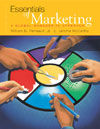 |
1 |  | 
An organized way of continually gathering, accessing, and analyzing information that marketing managers need to make decisions is a ________________________. |
|  | A) | Management information system (MIS) |
|  | B) | Marketing information system (MIS) |
|  | C) | Marketing data warehouse |
|  | D) | Decision support system (DSS) |
 |
 |
2 |  | 
A computer program that makes it easy for a marketing manager to get and use information as he or she is making decisions is a(n) _______________. |
|  | A) | Marketing information system (MIS) |
|  | B) | Search engine |
|  | C) | Decision support system (DSS) |
|  | D) | Marketing data warehouse |
 |
 |
3 |  | 
A _________ is a statement of relationships among marketing variables. |
|  | A) | Marketing model |
|  | B) | Hypotheses |
|  | C) | Situation analysis |
|  | D) | Research proposal |
 |
 |
4 |  | 
Marketing research involves procedures to develop and analyze new information to help marketing managers make decisions, using "facts" that are currently available in the MIS. |
|  | A) | True |
|  | B) | False |
 |
 |
5 |  | 
It is _____________ for a firm to contact customers under the pretense of doing research, when the real purpose is to sell something. |
|  | A) | Illegal |
|  | B) | Ethical |
|  | C) | Unethical |
|  | D) | Unfair |
 |
 |
6 |  | 
Applying the scientific method, what is the first step of the marketing research process? |
|  | A) | Analyze the situation |
|  | B) | Define the problem |
|  | C) | Gather problem-specific data |
|  | D) | Interpret the data |
 |
 |
7 |  | 
A___________ is an informal study of what information is already available in a particular problem area. |
|  | A) | Position statement |
|  | B) | Situation analysis |
|  | C) | Market research process |
|  | D) | Focus group interview |
 |
 |
8 |  | 
The two basic methods for obtaining information about customers are ___________. |
|  | A) | Questioning and focus group interviews |
|  | B) | Survey questionnaires and focus group interviews |
|  | C) | Observing and survey questionnaires |
|  | D) | Questioning and observing |
 |
 |
9 |  | 
Quantitative research seeks in-depth, open-ended responses, not yes or no answers. |
|  | A) | True |
|  | B) | False |
 |
 |
10 |  | 
The most widely used form of qualitative questioning in marketing research is the _________________. |
|  | A) | Focus group interview |
|  | B) | Survey questionnaires |
|  | C) | Telephone surveys |
|  | D) | Mail/email surveys |
 |
 |
11 |  | 
The conclusions reached from a focus group session can be relied on as "facts" that apply to a broad target market. |
|  | A) | True |
|  | B) | False |
 |
 |
12 |  | 
____________ is survey research that seeks structured responses that can be summarized in numbers, like percentages, averages or other statistics. |
|  | A) | Qualitative research |
|  | B) | Quantitative research |
|  | C) | Scientific method |
|  | D) | Situation analysis |
 |
 |
13 |  | 
The percentage of people contacted who complete a questionnaire is known as the ___________. |
|  | A) | Sample population |
|  | B) | Confidence interval |
|  | C) | Response rate |
|  | D) | Sample reliability |
 |
 |
14 |  | 
A "people meter" is a research device that involves attaching a machine to the TV set in the homes of selected families, and recording when the TV is on and what station was tuned in. |
|  | A) | True |
|  | B) | False |
 |
 |
15 |  | 
A group of consumers who provide information on a continuing basis is a(n) __________. |
|  | A) | Focus group |
|  | B) | Consumer panel |
|  | C) | Sample population |
|  | D) | Target market |
 |
 |
16 |  | 
Using the ____________________, researchers compare the responses of two or more groups that are similar except on the characteristic being tested. |
|  | A) | Scientific method |
|  | B) | Marketing research process |
|  | C) | Situation analysis |
|  | D) | Experimental method |
 |
 |
17 |  | 
The total group a researcher is interested in is known as the ______________, and the part of the relevant group studied is called a __________________ . |
|  | A) | Population; sample |
|  | B) | Sample; population |
|  | C) | Mass market; target market |
|  | D) | Population; random sample |
 |
 |
18 |  | 
An estimate from a representative sample usually varies somewhat from the true value for a total population. |
|  | A) | True |
|  | B) | False |
 |
 |
19 |  | 
Reliability concerns the extent to which data actually measures what is intended to be measured. |
|  | A) | True |
|  | B) | False |
 |




 2003 McGraw-Hill Higher Education
2003 McGraw-Hill Higher Education